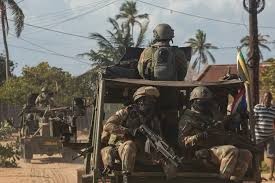Fighters fleeing insurgency ranks as Mozambique army reclaims lost territory – Army General
Many people are deserting the ranks of the Islamic insurgency in Mozambique as the military presses gains, according to the deputy chief of a multinational African force who admits the conflict remains a “puzzle”.
In an interview with AFP in the northern town of Pemba, Brigadier Dumisani Ndzinge said the jihadists were now operating from temporary bases, after the regional force reclaimed all of Mozambique’s lost territory in Cabo Delgado province.
“The terrorists were running riot in Cabo Delgado” when the regional forces arrived in August, he said. “They had killed people, decapitated people in Palma. They had full control of Mocimboa da Praia.”
“Right now, the terrorists are operating in smaller groups, in temporary bases, which is now the crux of our operations,” he said.
“It’s a deliberate move to stretch the security forces. But we are now following those small groups to make sure they don’t continue to terrorise the local population.”
The interview was conducted on 28 January, as Rwandan forces allowed journalists a rare visit to a region that had been largely cut off from the world for months.
The insurgents claim allegiance to the so-called Islamic State, but many of their supporters appear to be disaffected youth angry that multi-billion-dollar investments in natural gas have yet to improve life in the impoverished province.
Northern Mozambique has a long history of conflict with the south, during a 12-year civil war that ended in 1992, as well as smaller conflicts that erupted afterwards.
The latest violence began in 2017, with a religious overtone in the mainly Muslim north.
Since then at least 3 700 people have died – including 1 613 civilians – while a further 820 000 have fled in terror.
“It’s a puzzle,” Ndzinge said. “It’s supposed to be a religious thing. It looks like they are trying to establish an Islamic caliphate in this area of Cabo Delgado.
“There’s been a lot of people who have fled from the terrorist ranks,” he said. “A lot of people have escaped, and handed (themselves) over to our forces and to the local authorities.”
“Our intention is to keep the pressure, so that more people can desert the terrorist ranks,” he added.
When the international forces arrived last year, Ndzinge admitted that they lack coordination. Rwandan troops arrived in July, followed the next month by a multinational force from the Southern African Development Community (SADC).
Rwanda is not one of SADC’s 16 members, so “there was no official coordination mechanism between the two forces,” he said. Ndzinge himself is from Botswana.
“But once we were on the ground, and the Rwandese security forces were on the ground, we immediately recognised the necessity to work together.”
Their next targets are around the district of Macomia, where they believe insurgents fled after being driven from the northern region along the Tanzanian border, he said.
The stunning gains by the insurgents early last year prompted TotalEnergies to halt work on its 20-billion-dollar gas project, the largest foreign investment ever made anywhere in Africa.
Mozambique in recent weeks has made a concerted effort to reassure neighbours and investors that the country is safe again.
Over the last week, the leaders of South Africa and Tanzania have visited, along with the CEO of TotalEnergies.
Officially, the international deployment is open-ended. The region can scarcely afford to stay indefinitely, but Ndzinge sounds confident.
“We have managed to push them out of their main bases,” he said. “The critical thing now is for us to keep the pressure up on them.”


